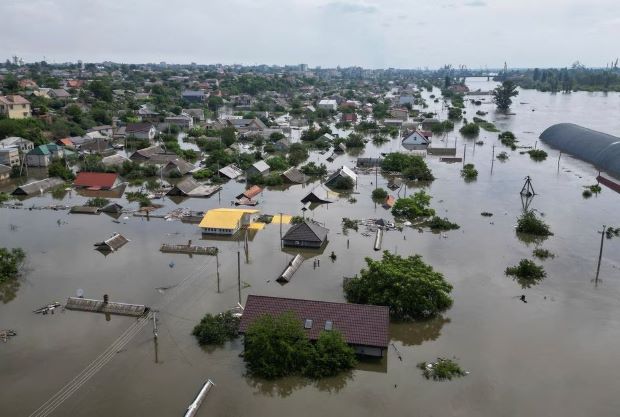Deadly shelling in flood-hit Ukraine region after Zelenskyy visit
By Yulia Silina
KHERSON – Ukraine and Russia accused each other of shelling in the flood-hit Kherson region on Thursday (8) even as rescuers raced to save people stranded after the destruction of a Russian-held dam unleashed a torrent of water.
Shortly after Ukrainian President Volodymyr Zelenskyy visited the southern city of Kherson, Kyiv said a Russian strike there injured eight people.
Moscow-installed authorities, who controlled the other bank of the now flood-swollen Dnipro River, said two evacuees were killed by Ukrainian shelling.
The Dnipro has steadily risen downstream from the breached Kakhovka dam, forcing thousands to flee their homes, flooding dozens of villages and parts of the regional capital Kherson and sparking fears of a humanitarian disaster.
The death toll from flooding reached six as Moscow-backed administration of Nova Kakhovka, where the dam is located, said five people had died and 41 were hospitalized.
Ukrainian police said one man had died in a riverside village in neighbouring Mykolaiv region, also affected by rising water levels.
Zelenskyy posted videos showing him meeting officials in the Kherson and Mykolaiv regions, as well as viewing evacuation efforts from beside the floodwater in Kherson and visiting survivors in a hospital.
“I thank the rescuers and volunteers! I thank everyone involved in this work!” he wrote.
AFP journalists heard artillery firing in Kherson on Thursday, striking the area used for rescue boats bringing in people from flooded areas.
“Due to targeted strikes by the occupiers during evacuations in the city, a civilian died. Two more people were wounded,” Kherson’s prosecutor’s office said.
Russian-installed authorities in turn accused Ukraine of shelling a civilian evacuation point in the Kherson region, killing two people.
Ukraine and Russia, which have traded blame over the dam’s destruction, have said they have evacuated more than 6,000 people and many more were fleeing by themselves.
A total of 600 square kilometres (230 square miles) of the Kherson region is underwater, Kherson regional governor Oleksandr Prokudin said on social media, 68% of which is in Russian-controlled territory.
Ukrainian rescuers were venturing into Russian-controlled areas to save civilians, a military press officer, Sergiy Sergiyiv, told AFP.
“For us the priority is our people.”
Ukrainian authorities have said 30 settlements have been flooded, 10 of which lie in territory controlled by Russia on the Dnipro’s eastern bank.
In Kherson, rescuers were using boats and amphibious vehicles to pluck people from flooded areas. Some volunteers were also going out to rescue stranded animals and birds.
One woman, Tetiana Omelchenko, 65, said she had waited two days for evacuation from her block of flats in Kherson and had to climb through a broken window to reach a rescue boat.
“In my building, the water has reached the third floor and there are still people in there,” she said.
An employee at Kherson’s meteorological agency, Lora Musiyan, waded into the water to mark the level on Thursday morning: 5.33 metres (17.4 feet) above the norm.
The water was rising more slowly, she said, however: up just 12 cm overnight, while at the peak, the water level had been rising 12-16 cm every half hour.
Zelenskyy singled out the United Nations and Red Cross for criticism in an interview with Germany’s Bild daily, claiming: “they are not there”.
The Red Cross of Ukraine denied this, saying it immediately began evacuating people and had six evacuation crews working and more than 200 volunteers providing humanitarian aid.
NATO Secretary General Jens Stoltenberg said he would chair a meeting Thursday of an emergency coordination panel on the “outrageous destruction”, with Ukraine’s foreign minister Dmytro Kuleba set to participate.
France has also said it will send aid to Ukraine.
The Kakhovka dam provided cooling water for Europe’s largest nuclear plant, Zaporizhzhia, which is under Russian control. The UN nuclear watchdog, the International Atomic Energy Agency, has said there was “no short-term risk” to the plant.
The dam’s reservoir level has plummeted as water drains out. Ukraine’s state hydroelectric enterprise Ukrhydroenergo said that plants upstream on the Dnipro were reducing capacity to minimise flooding.
Ukraine accuses Russia, whose forces control the dam area, of blowing up the dam, while Russia accuses Ukraine hitting it with artillery.
Ukrhydroenergo said that the dam was most likely mined from the inside.
The emergency service has warned the flood water has dislodged land mines that pose a threat to civilians.
The government has also sounded the alarm over the environmental impact, calling it “a crime of ecocide”.
A Greenpeace campaigner in Kyiv, Denys Tsutsaiev, warned that it could take a decade for some species to recover from the catastrophe and some may not recover at all.
According to the latest information, “at least 500 tonnes of oil was released due to the dam destruction,” the campaigner said, posing a threat to sea mammals and birds.
-Agence France-Presse



Comments are closed, but trackbacks and pingbacks are open.